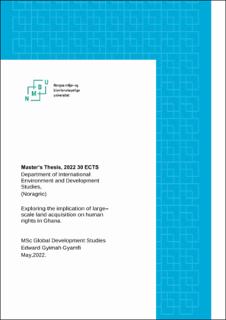| dc.contributor.advisor | Sjaastad, Espen Olav | |
| dc.contributor.author | Gyimah, Edward Gyamfi | |
| dc.coverage.spatial | Ghana | en_US |
| dc.date.accessioned | 2022-09-01T12:41:17Z | |
| dc.date.available | 2022-09-01T12:41:17Z | |
| dc.date.issued | 2022 | |
| dc.identifier.uri | https://hdl.handle.net/11250/3015175 | |
| dc.description.abstract | Copious evidence exists on studies into large scale land acquisition (LSLA) in Ghana. The literature is replete with divergent findings that support both the pessimist views (land investments always hurt locals and drain development) and optimists views (land investments brings total development to communities). This study examined the literature on large scale land acquisition and human rights in Ghana, to provide a more detailed perspective into the issue, inform policy and practice and contribute to literature. The qualitative literature review approach, involving a desk study was employed. A host of key terms were developed to retrieve relevant materials which were sifted using inclusion and exclusion criteria. An appraisal tool was used to synthesise evidence from the final papers and presented in a thematic fashion. The study found continuous efforts by government to blend statutory and customary laws and practices in the management of public and private land ownership rights in Ghana and this has remained quite challenging in the discourse of LSLA. The inefficiency of this effort created weak linkages among the major institutions and stakeholders in large- scale agro-investments. All these effects are as a result of the insufficiencies in the country’s land governance systems and partly caused by discrepancies between de jure and de facto procedures. The consequence is that land investment projects aimed at stimulating economic and social development, have resulted in dispossessions, injustices and environmental conflicts wherein indigenous communities have been deeply affected. Whereas employment and the social infrastructure provided by the firms sometimes help alleviate the plights of the communities – these were less significant compared to the deleterious impacts of the alienation from their lands. Overall, politically powerful chiefs have sought to re-assert their authority over land and the local population by allocating community land to investors, based on investors’ demands rather than the priorities of the state. Among other things, it is recommended that efforts be made to improve the interconnectedness and synergy between the customary land institutions and the statutory institutions while re-engineering the customary voice in ownership and decision making regarding the use of community lands. These will help improve the outcomes of such land deals. | en_US |
| dc.language.iso | eng | en_US |
| dc.publisher | Norwegian University of Life Sciences, Ås | en_US |
| dc.rights | Attribution-NonCommercial-NoDerivatives 4.0 Internasjonal | * |
| dc.rights.uri | http://creativecommons.org/licenses/by-nc-nd/4.0/deed.no | * |
| dc.subject | Land acquisition | en_US |
| dc.subject | Human rights | en_US |
| dc.title | Exploring the implication of large-scale land acquisition on human rights in Ghana | en_US |
| dc.type | Master thesis | en_US |
| dc.description.localcode | M-DS | en_US |

